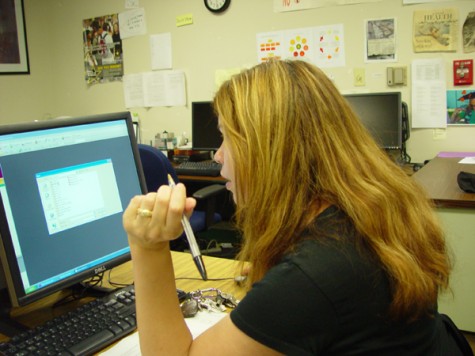Peggy Renner, a history professor, spoke about “Women and Work” on Oct. 9 as part of a series of lectures leading to a book signing next month by Sonia Nazario, the Pulitzerprize winning author of “Enrique’s Journey.”
More than 60 people attended the lecture in Kreider Hall at noon where Renner related the issue of women, work, and the progress that women have made in the work force to “Enrique’s Journey.”
Renner spoke of the choice that Enrique’s mother, Lourdes, made to leave her family in Honduras and venture to the United States to find work.
Lourdes finds work as a nanny and then a domestic servant.
Renner states that Lourdes was able to perform the job of a nanny because that’s what she knew, just as women in the 1900s would perform work that they were able to do since women weren’t thought of as capable of having an education.
“She dreamed of a better life for her children,” said Renner speaking of Lourdes. “She got work as a domestic servant, which was an important job for American women in the 1900s and it still is today. Those are the skills she knew even though she did not speak the language.”
“The domestic jobs in the 1900s and now share something in common. They required skills that women learned at home,” said Renner.
In 1940, the job of a domestic servant was the most important job that a woman could do without the need for education said Renner.
With education, women can be found in all categories of work now; in manufacturing, trades, service work, hard labor, although not equally distributed, but doors have been opened.
“The top 10 paying jobs held by women require education. Women are going to school longer, getting an education, giving them an important step up,” said Renner.
Some of the top jobs include: nursing, accounting, teaching, bookkeeping, and office clerk as stated by Renner during the lecture.
“Not only are we employed in greater numbers, and in a wider range of jobs with better pay, but some of us have risen to positions where we are recognized,” said Renner.
Renner said that women now hold half of the management positions in the country and now make 80 cents on a man’s dollar, when five years ago it was 70 cents and five years before that it was 62 cents; women’s pay is increasing.
Diana Markosian, 17, a political science major, said she “never realized that to this day that there’s so many separations between the work of men and women and how we need further change to make things equal.”
Although women have made advancements, full equality remains to be seen in the work force.
Renner advised attendees of the lecture to read “Enrique’s Journey,” which is relevant to the issues of working women. “It’s a really powerful book,” said Renner.
Renner’s advises women to most importantly “figure out what you love to do and find a job that will allow you to do that. If you enjoy doing it, you’ll get up everyday and say I want to go do it and if you don’t enjoy doing it, at some point you’ll say: I don’t care how much it pays me, it’s boring or it’s tedious.”
Nazario will be at GCC on Nov. 6 in Kreider Hall at noon.
Richard Kamei, associate professor of sociology, and Nathan Sheets, Glendale College and UC Berkeley alum, will hold the next in the series of lectures in Kreider Hall at noon, tomorrow.

